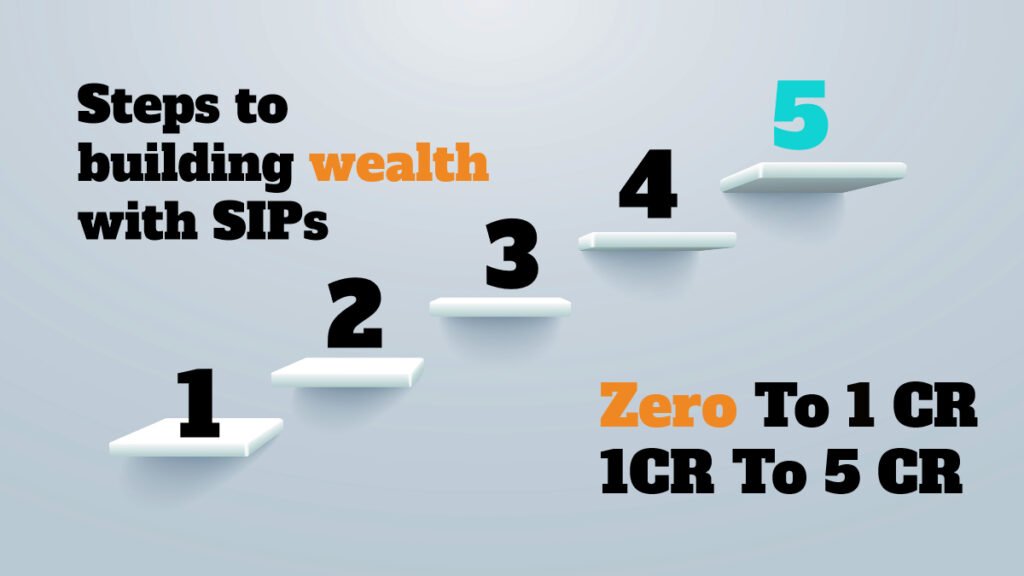5 Crore Dream to Reality with SIPs: Realistic Goals & Strategies (India)

Introduction
In India, the idea of accumulating a sizeable corpus like Rs 5 crore is a common aspiration. Systematic Investment Plans (SIPs) are a popular tool for achieving long-term financial goals. But can SIPs really help you reach Rs 5 crore within 5 years? Let’s delve into the reality and explore a more achievable strategy.
Why Earning Rs 5 Crore with SIPs in 5 Years Might Not Be Realistic
While SIPs are powerful for wealth creation, achieving a Rs 5 crore corpus within 5 years faces significant challenges:
- Expected Returns: Equity Mutual Funds, known for their growth potential, haven’t historically delivered a consistent 20% Compound Annual Growth Rate (CAGR) over a 5-year period. This high return rate is crucial to reach your target in such a short time.
- Market Volatility: Stock markets are inherently volatile. Investing with the expectation of exceptional returns inherently carries the risk of significant losses if the market underperforms.
Building a Realistic Roadmap with SIPs
Here’s a more practical approach to reach your financial goals:
- Extend Your Investment Horizon: Consider a longer investment timeframe. With a 10-15 year horizon, SIPs in equity mutual funds can help you accumulate a substantial corpus.
- Start Your SIP Journey: Begin investing in a well-diversified equity mutual fund that aligns with your risk tolerance. SIPs allow for disciplined, regular investments, averaging out market fluctuations over time.
- Consistency is Key: Be disciplined with your contributions. Consistent SIP installments help benefit from rupee-cost averaging and leverage the power of compounding.
Best Platform To Start SIP & Trading in 2024
Steps to building wealth with SIPs and achieve your long-term financial goals:

1. Extending Your Investment Horizon
Imagine you’re planting a money tree. With a 5-year timeframe, it’s unlikely to yield significant fruit. But with 10-15 years of growth, it flourishes! Similarly, SIPs work best over a longer period. Here’s why:
- Power of Compounding: Compounding allows your returns to generate even more returns over time. The longer you invest, the greater the compounding effect.
- Market Fluctuations Average Out: Stock markets go up and down. By investing regularly over a longer period, you purchase units at different NAVs (Net Asset Values). This averages out the cost per unit, reducing the impact of market volatility.
2. Starting Your SIP Journey
Think of SIPs like setting up an automated savings plan for your future. Here’s how it works:
- Choose a Well-Diversified Equity Fund: Equity funds invest in stocks, offering the potential for higher returns. Diversification means spreading your investment across different companies and sectors, mitigating risk.
- Align with Your Risk Tolerance: Are you comfortable with some volatility or prefer a more stable investment? Choose a fund that reflects your risk appetite.
- Start Investing Regularly: Even a small amount invested consistently through SIPs can grow significantly over time.
3. Consistency is Key
Imagine adding a little water to your money tree each month. Consistent care is vital for its growth. The same applies to SIPs:
- Discipline is Key: Set up an SIP to automatically deduct a fixed amount from your bank account at regular intervals (monthly, quarterly, etc.). This ensures you stay invested and avoid the temptation to skip contributions.
- Rupee-Cost Averaging: By consistently investing, you purchase more units when the NAV is low and fewer units when it’s high. This averages out the cost per unit over time.
- Compounding Magic: Regular contributions allow your returns to compound on top of each other, accelerating your wealth creation over the long term.
Remember, this is for informational purposes only. Consulting a SEBI Registered Investment Advisor (RIA) is crucial.
Disclaimer: This article is for informational purposes only and should not be considered financial advice. Please consult a qualified financial advisor before making any investment decisions. Investment advisors can assess your risk tolerance, financial goals, and investment capacity to create a plan suitable for you.









